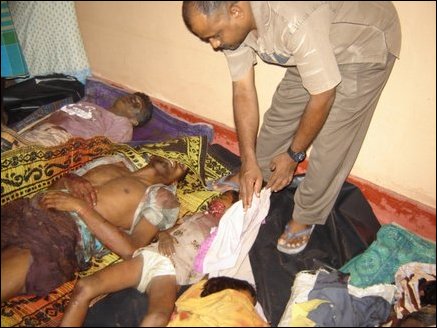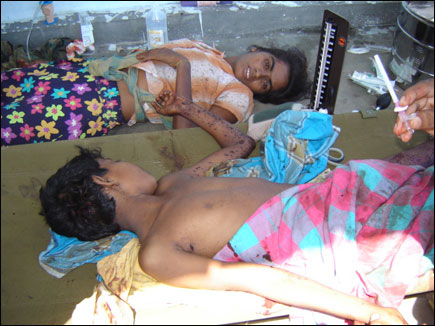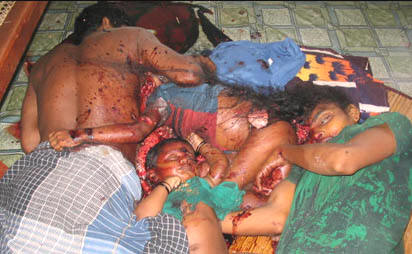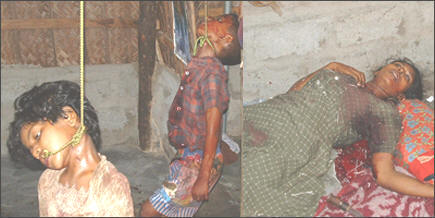|
INTERNATIONAL FRAME
&
THE STRUGGLE for Tamil Eelam
Sri Lanka's Strategy of Terror has International Backing
[together with comment by
tamilnation.org]
Tamil Guardian, 15 November 2006
Sri Lanka’s Sinhala dominated state is escalating its military
campaign to destroy the Tamil struggle. As it does so, its contempt for the
Ceasefire Agreement (CFA) and
international humanitarian law is undisguised. As ever, there are two
components to Sri Lanka’s strategy – attacking the Liberation Tigers on the one
hand and inducing terror amongst the Tamil populace on the other. These elements
have always been part of counter-insurgency in Sri Lanka. And they have always
had the approval of the international community.
Despite its
rhetoric of multi-ethnic plurality the reality is the state of Ceylon/ Sri
Lanka has, since independence, functioned on the logic of us-and-them when it
comes to the Sinhalese and the Tamils. And the 2002 peace process has pointedly
failed to corrode this racial hierarchy. The state’s response to the devastation
wrought by the 2004 tsunami – to ignore the Northeast and prioritise the South –
is archetypical. The point was underscored last week by a frustrated Operation
USA.
But it is the state’s escalating violence against the Tamil population that is
doing most to illuminate contemporary ethnic relations in the island. Sri
Lanka’s artillery
targeted a refugee camp in Vakarai. At least 40 people were killed and 100
wounded.
 
As ever, mimicking justifications of atrocities in another part
of the world, Sri Lanka said it was counter-attacking LTTE gun positions – a
claim
rejected by international ceasefire monitors and human rights groups who
spoke to survivors and residents. But the Army also blocked the ICRC and other
aid agencies from the area for several hours. It refused to let the badly
wounded civilians out to reach hospital. And for the past six months, the Sri
Lankan military has been brazenly blocking food, medicine and other essentials
to Vakarai and other Tamil region. The protests of international aid agencies,
Tamil parliamentarians and
human rights groups have been derisively ignored.
And apart from meting out this collective punishment against Tamils in areas
controlled by the Tigers, in its own controlled areas, the state is waging a
murderous campaign against anyone even slightly inclined to agitate against it.
It is not simply a matter of LTTE cadres or supporters, but anyone dabbling in
Tamil political activity.
It is inevitable perhaps that parliamentarians of the Tamil
National Alliance (TNA) are targets for the Army-backed paramilitaries and death
squads.The
assassination of Nadaraja Raviraj, MP, last Friday is, as his colleagues
say, an attempt to silence their vocal criticism of the state. But it is more
than that. The killing, and the wider campaign of terror, is intended to send a
message to the wider Tamil community that it is the state, not the international
community or the LTTE that controls their fate.
The
begrudging and feeble criticism of Sri Lankan atrocities by the international
community is shameful and revealing. It confirms what the Tamil sceptics
have always said about the Norwegian peace process – that it is an exercise in
counter-terrorism, rather than conflict resolution, that it is about
hamstringing the LTTE and bolstering the state, rather than ensuring a just
solution.
Comment by
tamilnation.org
see also
Dr.S.Sathananthan in A to Z of Conflict Resolution in Sri
Lanka, 22 September 2004 "..At first intermittent
"talks" with the national movement are mooted to legitimise the State's
military onslaught as unavoidable and indeed made necessary by the
"lawlessness" of the national movement. But when a military stalemate
ensues, then "talks" become the continuation of war by other means.
Having failed to disarm the national movement through force, the State then
manoeuvres to draw the movement into "talks" with the principle objective of
forcing it to decommission weapons. This continuation of war by other
means is the so-called "peace process". If armed conflict is the power
struggle at the military level, "peace process" is the power struggle at the
political level..."
In the past few years, there has been much public berating and
lecturing to the LTTE about human rights, child rights, political assassinations
and so on. But now these formerly strident voices have gone silent.
The point is that these international principles are raised only when they serve
to undermine the Tamil struggle, but not when Tamils are victims. After all, we
remember the approving international silence during the ‘war
for peace.’ Those days are back.
Dozens of ordinary Tamils are being murdered each week.


Tens of thousands are being harried daily
by
military bombardment. Hundreds of thousands of our people are suffering
shortages of food and medicine.
And it is the international community’s tacit collusion in this onslaught that
we must come to terms with. The Sri Lankan state is behaving in the same manner
it always has. As President Junius Jayawardene blithely observed in July 1983:
“The more you put pressure in the north, the happier the Sinhala people will be
here. Really, if I starve the Tamils out, the Sinhala people will be happy.”
What the Tamils need to understand is that if such brutality
against our people will result in us abandoning our demands for our political
rights then the international community will also be happy. Which is why there
has been no real pressure on Sri Lanka to desist. Which is why the international
response to Sri Lankan violence against us is a mocking call for the state to
investigate and punish itself. Which is why, even now, there is no international
diplomacy to avert the violence.
Comment by
tamilnation.org
The question that the Tamil people will increasingly ask is: why
is it that the international community seeks to avoid supporting
the struggle of the people of Tamil Eelam to be free from alien
Sinhala rule? Here see
Nadesan Satyendra in Sri Lanka - Tamil Eelam: Getting to Yes,
27 October 2006
"...In an important sense for the
past 25 years and more, it will be true to say that two
conflicts have raged in the island of Sri Lanka. One is the
conflict between the Tamil people and the Sinhala people... We
need to examine the interests behind the stated positions of the
US and India. We need to do so despite the apparent preference
of the US as well as India to advance their interests by
asserting that they are disinterested good Samaritans concerned
simply with bringing peace to a troubled island. But the facts
belie these assertions. We need to address the strategic
interests of the US and India because the political reality is
that a conflict resolution process in relation to the Tamil
Eelam-Sri Lanka conflict will not succeed without
resolving the US-India conflict in the Indian Ocean Region....
Stated broadly,
US foreign policy
is directed to build on its current position as the
sole surviving super power and secure a
unipolar world
(with a 'multi polar perspective' -
a la Condoleezza Rice) for the foreseeable
future. And this means, amongst other matters,
preventing the rise of independent regional hegemons.
On the other hand, the
central plank of New Delhi's
foreign policy is to deny any
independent intermediary role to extra
regional powers in the affairs of the Indian region and also to
further the
emergence of a multi lateral world. In
this latter objective, New Delhi may count on the 'calibrated'
support of the
European Union,
Russia,
China
and Iran amongst others.
Given the difference in the end goals that US and India
have, it should not be surprising if the policies of the United
States and New Delhi in relation to Sri Lanka and the LTTE are not
always congruent. But that is not to say that the United States
will not cooperate with India. It will. It will seek to cooperate 'as a
super power' - and the US believes that it has sufficient instruments in
its armoury to do just that. One such instrument is the
Norwegian sponsored Peace Process. This explains the consistently
enthusiastic support that the Peace process has received from the United
States and the more muted (and calibrated) support from India.
This also helps us understand the covert
operations of RAW
in Tamil areas in the island of Sri Lanka and the material support
extended by India to Sinhala governments and Sri Lanka political
parties. In the 1980s, RAW gave covert material and financial support to
the Tamil militants to secure the same end - Indian hegemony in the
Indian Ocean region. It appears that New Delhi's interests
remain permanent, though its 'friends' may have changed from time to
time. Because New Delhi does not have the clout of a super power, it
seeks to manage the Tamil struggle to progress its own ends by
infiltrating the Tamil struggle - both in Tamil Eelam and abroad. That
is what it did in 1980s and that is what it is doing today.
Today, both India and the US state openly that they
are intent on securing the territorial integrity of Sri Lanka. They do
not do so because of some generalised statist disdain for the emergence
of new states. Did the international community have the same
'statist disdain' in the case of Croatia? Or for that matter in
the case of Latvia, Lithuania and the Ukraine? The reason is to be found
in the specific strategic concerns of the US and India in relation to
the Indian region. And we need to understand the inter play if we are to
progress the conflict resolution process in Sri Lanka. ...The uneasy
power balance in the Indian Ocean region must be assessed in the light
of
"...two geopolitical triangles juxtaposing on
the Indian Ocean's background: U.S.-India-China relations and
China-Pakistan-India relations. In this complicated geopolitical
configuration, New Delhi is not simply a partner of China or the United
States: India is emerging as a major power that follows its own grand
strategy in order to enhance its power and interests..."
India's Project Seabird and the Indian Ocean's Balance of
Power - PINR, 2005
-
more
|